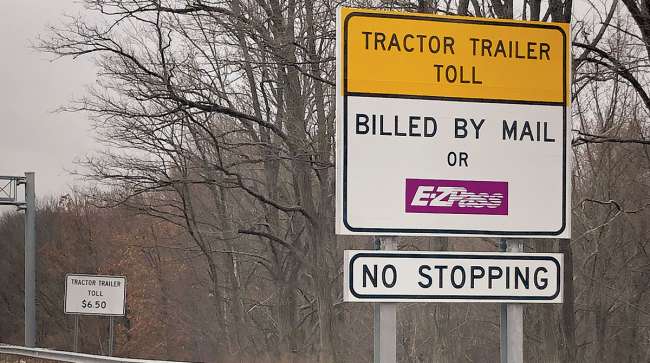Senior Reporter
Rhode Island DOT Seeks Appeal on Truck Tolling Case

[Stay on top of transportation news: Get TTNews in your inbox.]
The Rhode Island Department of Transportation is seeking an appeal of a federal court’s ruling that its trucks-only tolling program is unconstitutional.
In a 181-page briefing document, filed Feb. 10 with the U.S. Court of Appeals for the First Circuit, RIDOT asked that the Sept. 21 decision by District Judge William Smith declaring the program unconstitutional be reversed, and that oral arguments be held on the case.
The trucks-only tolling system was part of then-Gov. Gina Raimondo’s broader RhodeWorks program, which had been projected to generate $4.7 billion to finance infrastructure projects. The toll charge was shut down hours after Smith’s ruling.
The lawsuit, filed nearly four years ago by American Trucking Associations and two motor carriers, alleged that the hotly contested tolling plan required out-of-state heavy trucks to pay nearly all of the tolls, while exempting state businesses, cars and intrastate motor carriers. The trial on the lawsuit ended June 13 after two weeks of testimony. The program administered tolls only to motor carriers traveling through the state.

Raimondo
In response to the appeal request, ATA Vice President of Public Affairs Sean McNally said, “We are preparing our response to Rhode Island’s appeal of the district court’s thorough and well-reasoned decision and we look forward to explaining to the First Circuit why the district court got it right.”
In that ruling, Smith wrote, “Because RhodeWorks fails to fairly apportion its tolls among bridge users based on a fair approximation of their use of the bridges, [it] was enacted with a discriminatory purpose, and is discriminatory in effect, the statute’s tolling regime is unconstitutional under the dormant Commerce Clause of the United States Constitution.”
In its appeal, RIDOT said the appellate court should grant oral argument because the district court struck down a state statute on federal constitutional grounds. It also maintains that the case presents important questions relating to federalism and the Commerce Clause.

McNally
“The Commerce Clause regulates effects, not motives, and it does not require courts to inquire into … legislators’ reasons for enacting a law that has a discriminatory effect,” RIDOT said. “If legislation were deemed ‘discriminatory’ every time a legislator declared she had heard her constituents’ concerns, few laws would survive.”
It added, “The district court gleaned discriminatory intent from stray statements by two officials. But this court has cautioned against precisely that error. Second, RhodeWorks does not unduly burden interstate commerce — its per-crossing tolls on the heaviest vehicle classes represent a ‘fair approximation’ of bridge use.’ ” RIDOT further maintained that the tolls “apply even-handedly to the vehicle classes that tend to do the most damage to bridges, regardless of the vehicles’ registration. Charging all tractor-trailers does not disadvantage any similarly situated out-of-state businesses.”
Want more news? Listen to today's daily briefing below or go here for more info:




